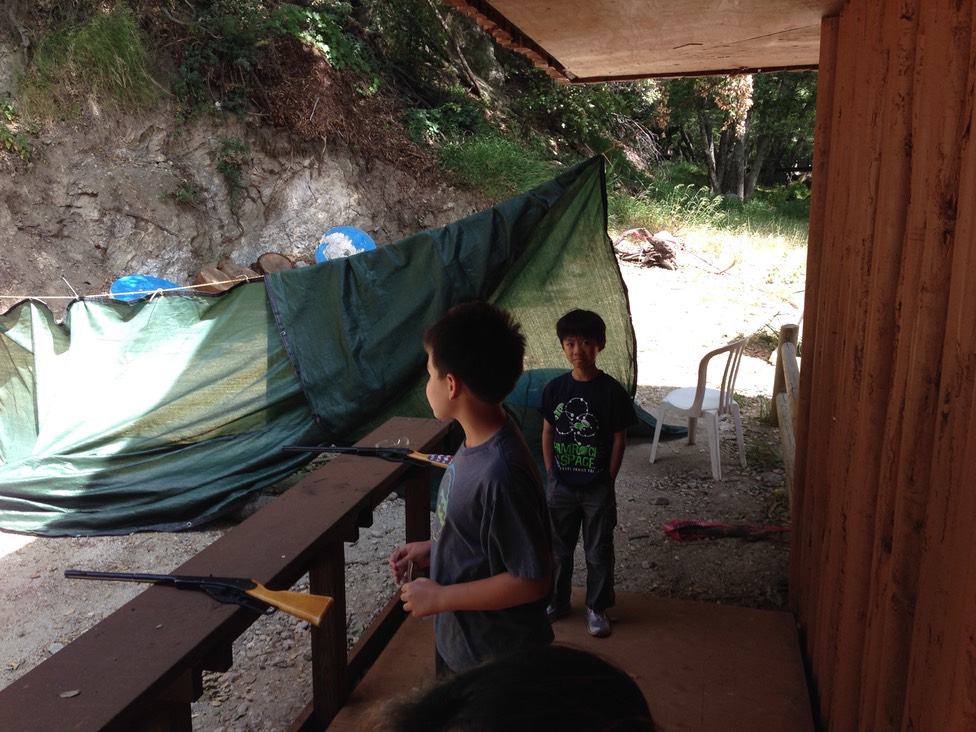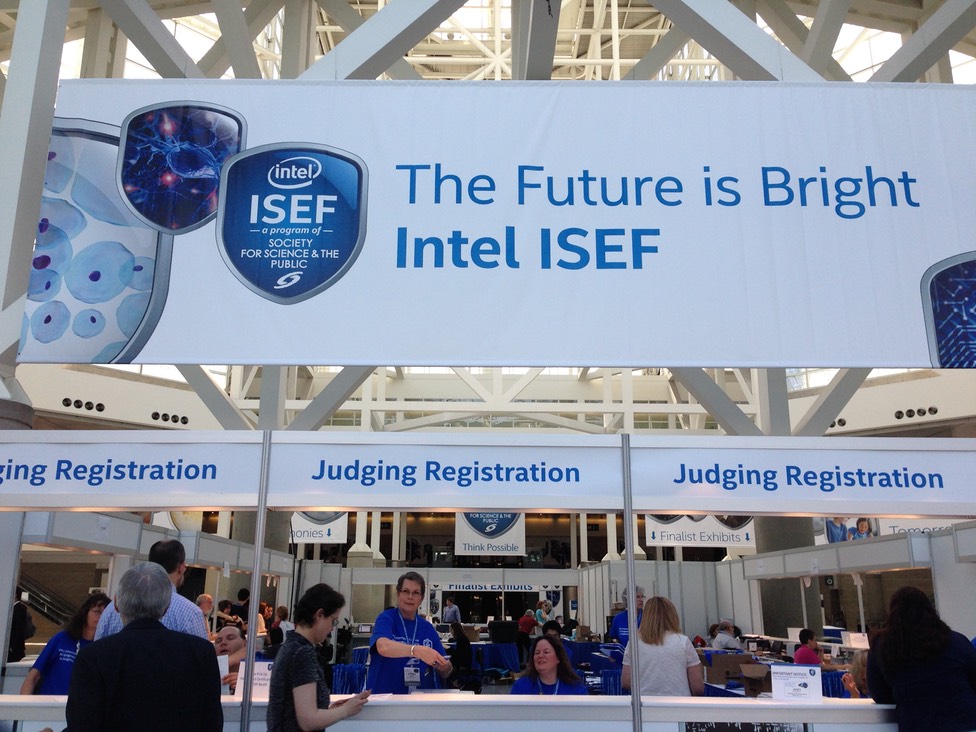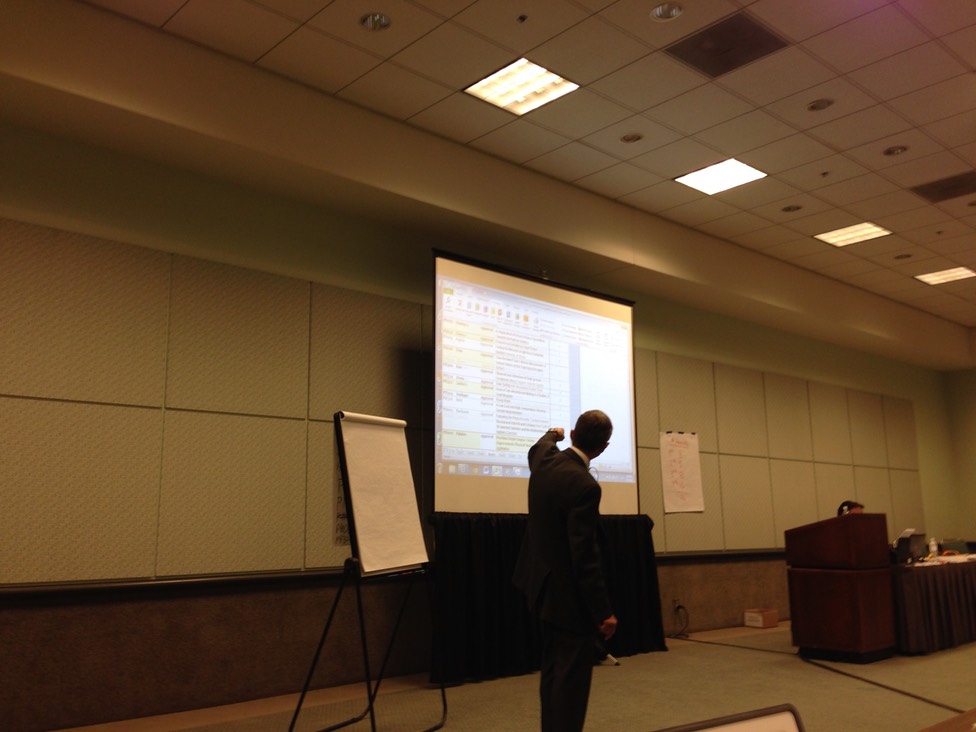
This past weekend, J and I went on his Cub Scout Pack’s annual campout. Unfortunately, the San Gabriel Valley Council decided not to open up Camp Cherry Valley for Cub Scout camping this year, so the Pack went to Camp Trask for an overnight, instead. I would have preferred CCV, with the longer stay on Catalina Island, the plethora of activities, and the island environment. However, Camp Trask is very conventiently near to Pasadena, and the Pack had dinner catered, so that was nice. The boys got to do a little archery and BB gun shooting — I did both, too, and hit my targets nicely. The boys also got to go on a couple of hikes, and I got to use the hiking sticks I had bought for the Anza Borrego Boy Scout trip.
A lot of the parents are parents of Webelos who are bridging over to W’s Boy Scout Troop, and one of the dads is also a former Scoutmaster for that troop. So we had lots of discussion with new parents about what to expect.
On Sunday, the day of our departure, J got out his football and was passing with some friends near the camp pond. Unfortunately, the ball went into the pond at one point. I went to get a rope while the ball was close to the shore — the pond wasn’t deep, but the bottom looked pretty scummy, so nobody wanted to wade in to get the ball. Then Charles, one of the dads, decided to get one of the boats and paddle out to get it. He got about 20 feet from shore when he looked in the back of his boat and said, “Uh oh, it’s sinking! I’d better get back!”
He paddled back quickly. It turns out there was a leak. We had a nice laugh at that. He then found another boat and got the ball.
While J and I were away, W had a piano recital along with many or most of Vatche’s other students. He played an Arabesque by Burgmüller and a Sonatina by Beethoven. Hsuan took video.

I was a judge at the Intel International Science and Engineering Fair on Tuesday and Wednesday at the LA Convention Center this week. This is the world’s largest science fair, and it includes not only the best students from the USA but also internationally. This was my first time judging this fair, and I was in the Physics and Astronomy category (Instrumentation and Electronics subcategory, but all the judges judged across the category). Tuesday was our orientation and an opportunity to view our assigned projects without the students, and on Wednesday, we interviewed the students and caucused to determine the winners.
There were 96 projects in the category, 57 judges, and 26 awards to determine. The awards were divided into 3 first place awards (with one judged best-in-category), 5 second place, 8 third place, and 10 fourth place. The award tiers included monetary prizes. I was assigned 14 projects to view and interview, I got to select two more, and after the main rounds of interviews, I volunteered to join a team with two other judges to interview one more top candidate.

The Physics and Astronomy category is one of the largest and most-international of the categories. Because no judge can view, interview, and score all of the projects, and because each judge has an individual, somewhat subjective scoring scale (despite scoring guidelines), all of the scores have to be accumulated and cross-referenced. For example, while one project might be considered very highly across its judges and be scored in the top quintiles for each judge, another set of judges might consider another project in only a middling quintile but give a very similar numeric score (on a scale of 0-100). So things have to be balanced out and cross-referenced before getting some sort of ranking.
The Intel ISEF used software by Syncrety in order to do this score accumulation, cross-referencing, and ranking. The software results aren’t binding. The results are just an initial ranking, and then the judges can debate to alter the rankings based on their judgment and discussion.
Unfortunately, when it came time to caucus and determine awards, the computers weren’t working, or something. You’d think an Intel competition would get their computers working.
So, that left us to do things the old fashioned way — long discussions in which judges proposed projects for first place consideration, then debates, and votes to whittle things down to three first place winners. And then on to the top-in-category, then second place winners, then third place, then fourth place. Judges had their pet favorites and made arguments in favor of them, but then other judges made arguments against.
I myself stood up to argue against one project getting first place, saying I thought the project was good and solid but deserved second place instead of first for not reviewing the scientific literature and finding out that the result had already been made in 1995 and again in 2013 with a newer experiment. A professional scientist always reviews the literature before making a claim of a novel result. Also, one of my fellow judges told me “At first, I thought you were being too harsh, but then I Googled it and found that result second from the top. You’d think [the student] could have Googled it.” He voted with me, along with several others, but we were in the minority.
About two hours into our debate, we had finally voted on the top three (first place) winners, and we were starting in on the five second place winners, when an official came in and told our chairmen that the software was ready. That caused some consternation, since we had already spent two hours coming up with first place winners, but the chairmen decided to use the software and then go ahead and adjust the placings.
We had another two hours of debate as judges proposed swapping this or that project for another one in the rankings. Only a couple of projects I had been assigned had a chance of getting awards, and one other judge proposed one of them for consideration, but neither made it. It was getting past 9:30 PM, and our lead chairman kept reminding judges that we could keep doing these binary comparisons and votes for a very, very long time — as we had already been doing.
Eventually, we exhausted ourselves and closed out the votes. I shook hands with both chairmen and left.
The Judges Reception outside the meeting rooms was already well past starting and was, in fact, winding down by the time I and my fellow Physics and Astronomy judges walked through the reception area and out to our cars.
There was, apparently, an NBA Final at the Staples Center, which made my exit from downtown LA take forever… or maybe that was just normal LA nighttime traffic.